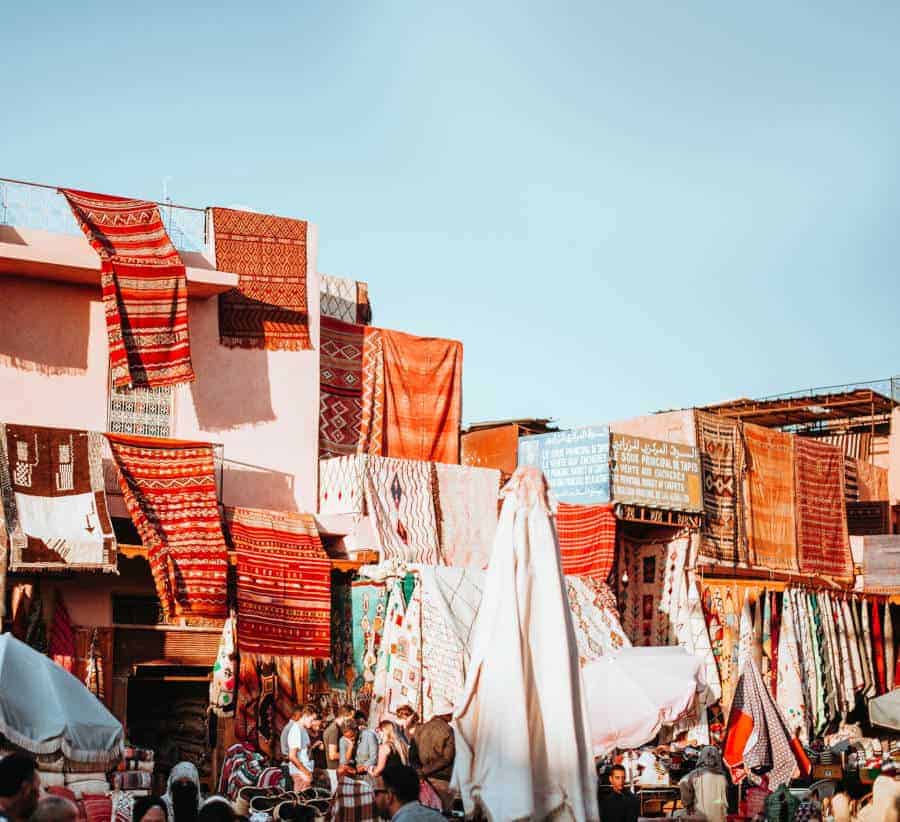
Morocco is unique for its rich blend of cultures, stunning landscapes, and vibrant traditions. Some of the key elements that make Morocco distinct include:
1. Diverse Landscapes:
- Atlas Mountains: The rugged Atlas Mountains offer stunning scenery, from snow-capped peaks to lush valleys. These mountains are home to traditional Berber villages and trekking routes that attract adventurers.
- Sahara Desert: Morocco is known for its vast expanses of the Sahara Desert, where visitors can experience the magic of the dunes, ride camels, and stay in desert camps under the stars.
- Coastline: With long stretches of coastline along both the Atlantic Ocean and the Mediterranean Sea, Morocco boasts beautiful beaches, fishing villages, and vibrant coastal cities like Essaouira and Tangier.
2. Traditional Architecture:
- Medinas: Morocco’s ancient medinas (old cities) are labyrinths of narrow alleys, souks, and historic buildings. Cities like Fez and Marrakech have some of the most well-preserved medinas in the world, filled with traditional riads, mosques, and palaces.
- Kasbahs and Riads: Traditional Moroccan architecture is distinctive, with fortified kasbahs (fortresses) and riads (homes with interior courtyards) featuring intricate tilework (zellige), stucco, and carved woodwork.
- Majorelle Garden: In Marrakech, the famous Majorelle Garden, once owned by Yves Saint Laurent, is an iconic example of Moroccan landscape architecture, blending vibrant colors with lush greenery.
3. Cultural Diversity:
- Morocco is a melting pot of Berber, Arab, African, and European influences. This diversity is reflected in its languages, food, art, and music. The country is home to Berber (Amazigh) traditions, Arabic-Islamic culture, and a legacy of French and Spanish colonial influence.
4. Unique Cuisine:
- Moroccan cuisine is known for its rich flavors and use of spices such as cumin, cinnamon, and saffron. Signature dishes include tagine, couscous, and pastilla. The use of preserved lemons, harissa, and argan oil are some unique elements that distinguish Moroccan cooking.
- Mint Tea (Atai): Mint tea is a cultural symbol of Morocco, reflecting the country’s hospitality. The ritual of preparing and serving tea is deeply ingrained in Moroccan daily life.
5. Souks and Artisan Crafts:
- Morocco’s souks (traditional markets) are famous for their vibrant atmosphere, offering everything from spices to handcrafted goods like Berber rugs, leather products, ceramics, and jewelry. Cities like Marrakech and Fez are known for their bustling souks, where haggling is an expected part of the experience.
- Moroccan artisans are renowned for their craftsmanship, particularly in zellige (mosaic tilework), carpets, metalwork, and leather tanning.
6. Historical Sites:
- UNESCO World Heritage Sites: Morocco is home to several UNESCO World Heritage Sites, including the ancient city of Fez, the Roman ruins of Volubilis, and the fortified village of Ait Benhaddou. These sites reflect Morocco’s rich historical and architectural heritage.
- Hassan II Mosque: In Casablanca, the Hassan II Mosque is one of the largest mosques in the world, with a minaret that stands as the tallest in Africa. It is a stunning example of modern Moroccan architecture.
7. Festivals and Music:
- Morocco is known for its vibrant festivals, celebrating everything from film to music. The Marrakech International Film Festival and the Fes Festival of World Sacred Music attract international attention.
- Gnawa Music: Unique to Morocco, Gnawa music combines African, Berber, and Islamic spiritual traditions. This trance-like music is deeply rooted in the culture, particularly in the southern regions and cities like Essaouira.
8. Berber Culture:
- The Berber, or Amazigh, people are the indigenous inhabitants of Morocco, and their culture is a significant part of the country’s identity. Traditional Berber clothing, music, and crafts are distinctive, and the Berber language, Tamazight, is recognized as an official language of Morocco.
9. Islamic Architecture and Influence:
- Morocco’s Islamic architecture is notable for its intricate geometric designs, arabesques, and calligraphy. Historic mosques like the Koutoubia Mosque in Marrakech and the Al Quaraouiyine Mosque in Fez showcase this artistic tradition.
10. Film Industry:
- Morocco is a popular location for international film productions due to its diverse landscapes and historic architecture. Cities like Ouarzazate are known as the “Hollywood of Africa” and have been used as filming locations for famous films and TV shows, such as Gladiator and Game of Thrones.
11. Spiritual and Mystical Traditions:
- Morocco has a rich tradition of Sufism, a mystical form of Islam that emphasizes personal spiritual development. Sufi practices, music, and festivals are an important aspect of the country’s religious life.
- Zaouias (Sufi lodges) are found across the country, serving as spiritual centers and places of pilgrimage.
12. Unique Climate:
- Morocco’s climate is incredibly diverse, with everything from snow-capped mountains in the Atlas Range to the scorching heat of the Sahara Desert. The country’s varied geography allows visitors to experience multiple climates and landscapes in a single trip.
Conclusion:
Morocco is unique for its rich cultural heritage, vibrant traditions, stunning landscapes, and blend of African, Arab, Berber, and European influences. Whether through its architecture, cuisine, music, or festivals, Morocco offers a distinct cultural experience that is unlike anywhere else in the world.
Was this helpful?
0 / 0







